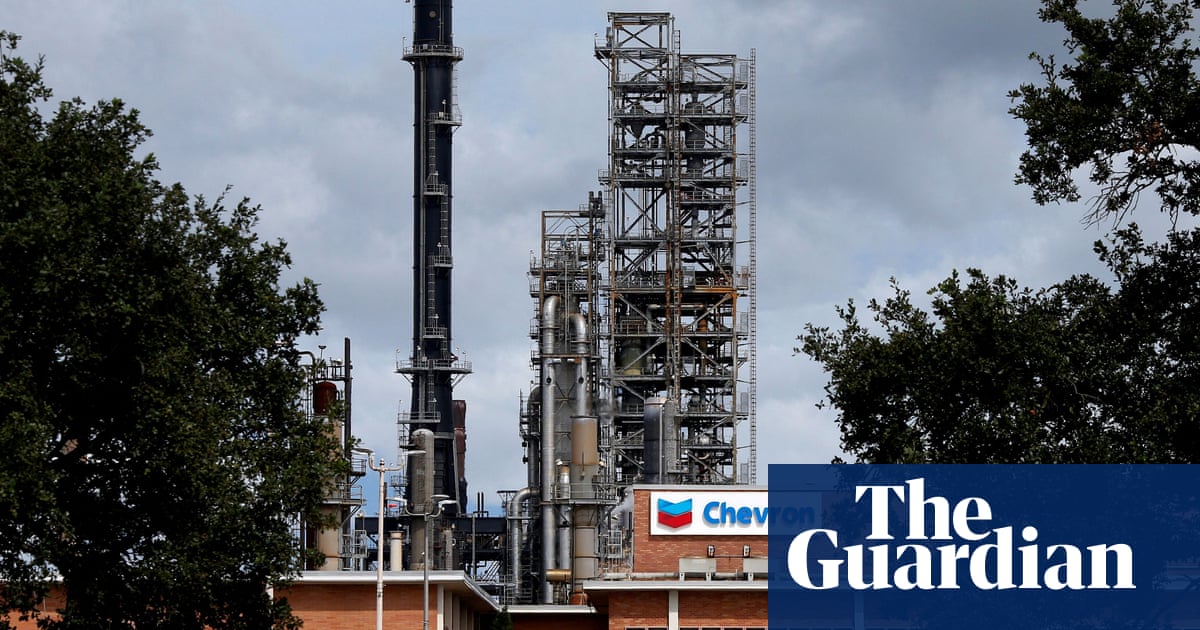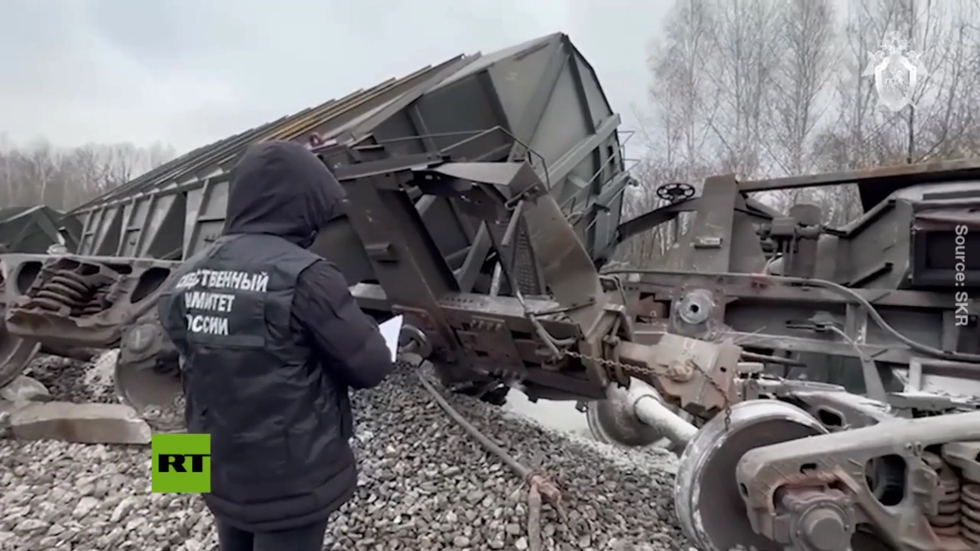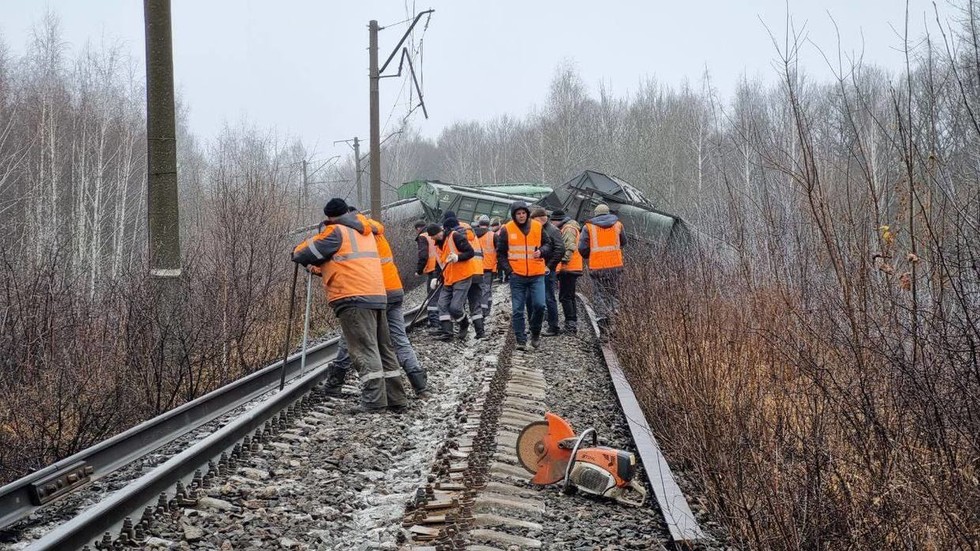You are using an out of date browser. It may not display this or other websites correctly.
You should upgrade or use an alternative browser.
You should upgrade or use an alternative browser.
Train derailments and explosions and chemical spills
- Thread starter Gimpy
- Start date
Pennsylvania homes evacuated after early morning train derailment
Homes and businesses in Montgomery County, Pennsylvania, were evacuated Monday after a CSX Norfolk Southern train derailed.
Police said the derailed train cars do not pose a threat to the public as they were only carrying silicone pellets, according to a local Fox affiliate. Sources initially told the outlet that 15 to 20 cars with reported hazardous materials derailed, sparking a Level 2 hazmat response.
First responders are on the scene and police say residents and businesses closest to the site were evacuated out of an abundance of caution.
"My team and I are monitoring the train derailment in Whitemarsh Twp and assisting local first responders. Thank you to the residents taking precautions at the direction of local authorities. I urge you to continue following their instruction," Pennsylvania Gov. Josh Shapiro tweeted.
India no stranger to rail accidents
Despite government efforts to improve rail safety, accidents occur every year on India's railways, the largest train network under one management in the world.
In 2018, a commuter train drove through a crowd gathered on the tracks for a festival in the northern city of Amritsar, killing at least 59 people and injuring dozens of others.
In 2017, over 40 people were killed after several coaches of a passenger train went off the rails in the southern state of Andhra Pradesh.
Most train accidents in the country are blamed on human error or outdated signaling equipment.
More than 12 million people ride 14,000 trains across India every day, traveling on 64,000 kilometers (40,000 miles) of track.

Signal error caused deadly Indian train tragedy – report
India’s Ministry of Railways releases the findings of a probe into Odisha train disaster, pointing to fatal errors in signaling connections
The report by the Commissioner of railway safety, disclosed in response to questions raised by Dr John Brittas, a member of Rajya Sabha, the upper house of parliament, focused on signaling connections as the cause of the country’s worst train tragedy in over two decades. 41 bodies recovered from the site are still unidentified – while over 1000 passengers were injured.
The report detailed signaling circuit alteration lapses, and errors during the replacement of an electric lifting barrier which lead to a collision between the Kolkata-Chennai Coromandel Express, the Bengaluru-Howrah Superfast Express, and a stationary goods train, the report stated.
Earlier this month, India's Central Bureau of Investigation (CBI), the country’s top crime investigation agency, arrested three Indian Railways employees for alleged involvement in the lapses that led to the disaster. They were charged with culpable homicide not amounting to murder, and destruction of evidence. The accused are in judicial custody after their CBI remand period ended on July 15, and the next hearing on the case is slated for July 27.
The probe also shed light on a similar signal error that had occurred due to incorrect wiring and a cable fault at Bankranayabaz station in West Bengal on May 16, 2022. The CRS report said that if corrective measures had been taken after last year’s incident, the Balasore tragedy could have been prevented.
The usual politicking.The Congress, India’s main opposition party, has hit out at Prime Minister Narendra Modi’s government following the release of the report’s findings. The party alleged that the Modi administration has “thoroughly compromised” on basic issues of railway safety, and that this “human error” exposes the failure of management and political leadership.
When I go out for a walk, come across a train track and see large cargo train. If I count the number of cars, I I always find them between 100 to 150 with one front engine dragging this criss crossing /up and down in this little mountainous terrain. Any little instability on the terrain can create big derailment affecting at least 40 to 50 train cars. I hope they have better protection mechanisms.
From The Guardian - excerpt:
Revealed: the US is averaging one chemical accident every two days
Mike DeWine, the Ohio governor, recently lamented the toll taken on the residents of East Palestine after the toxic train derailment there, saying “no other community should have to go through this”.
But such accidents are happening with striking regularity. A Guardian analysis of data collected by the Environmental Protection Agency (EPA) and by non-profit groups that track chemical accidents in the US shows that accidental releases – be they through train derailments, truck crashes, pipeline ruptures or industrial plant leaks and spills – are happening consistently across the country.
To add to the above, a few months ago the EPA has approved a refining process at Chevron that converts plastic into fuel. It's been hailed as a way to save the environment by reducing plastic waste, except that the cancer risk is 250,000 higher than the levels normally considered acceptable by the EPA.

EPA faces questions over plastic-based fuel with huge cancer risk
Agency sued after ProPublica and the Guardian revealed the EPA gave a Chevron refinery approval for a fuel that could leave people nearby with a one-in-four lifetime risk of cancer
The Environmental Protection Agency (EPA) is facing a lawsuit filed by a community group and questions from a US senator over the agency’s approval of fuels made from discarded plastic under a program it touted as “climate-friendly”.
The new scrutiny is in response to an earlier investigation by ProPublica and the Guardian that revealed the EPA approved the new chemicals even though its own scientists calculated that pollution from production of one of the plastic-based fuels was so toxic that one in four people exposed to it over their lifetime would be expected to develop cancer. That risk is 250,000 times greater than the level usually considered acceptable by the EPA division that approves new chemicals, and it’s higher than the lifetime risk of cancer for current smokers.
On Friday, a community organization sued the EPA in the US court of appeals in Washington DC, over the agency’s decision to allow a Chevron refinery in Pascagoula, Mississippi, to produce the fuels derived from plastic waste, including the one that could subject people nearby to a one-in-four lifetime cancer risk. Cherokee Concerned Citizens, which represents residents in a housing subdivision close to that refinery, is asking the court to invalidate the EPA’s approval of the new chemicals.
Earlier in the week, the chair of the US Senate subcommittee that oversees chemical safety questioned the head of the EPA over the agency’s approval of those fuels. Senator Jeff Merkley, a Democrat from Oregon, told the EPA administrator, Michael Regan, in a letter sent on Wednesday that he found what ProPublica and the Guardian discovered “especially troubling”.
“While it is urgent that our country takes actions to address climate chaos we need to ensure that the steps we take actually reduce greenhouse gas emissions and do not do so by sacrificing historically marginalized communities and those who are already overburdened by toxic pollution,” Merkley wrote.
The plastic-based fuels were given a green light under an EPA program designed to make it easier to create alternatives to fossil fuels. As ProPublica and the Guardian noted in the February story, making fuel from plastic is in some ways worse for the climate than simply creating it directly from coal, oil or gas. That’s because nearly all plastic is derived from fossil fuels, and additional fossil fuels are used to generate the heat that turns discarded plastic into fuels.
Federal law does not allow the EPA to approve new chemicals that have serious health or environmental risks unless the agency finds ways to minimize them. Yet, the agency approved the new plastic-based fuels without requiring lab tests, air monitoring or controls that would reduce the release of cancer-causing pollutants or nearby residents’ exposure to them, ProPublica and the Guardian found.
The sky-high risks and lack of safeguards for the people who would breathe pollution from the refinery’s smokestack are at the center of a lawsuit brought by residents of Pascagoula’s Cherokee Forest subdivision. The subdivision, which is near a number of industrial facilities, was inundated with cancer-causing pollution well before the new fuels were approved, as ProPublica reported in 2021, and the residents have been working for years to curb local emissions.
Barbara Weckesser, a resident who co-founded the group that’s suing the EPA, said she was surveying her neighbors about illnesses she fears are related to pollution just before she read about the approval of the plastic-based fuels on ProPublica’s website. “I was sitting down in my chair and I said holy … I won’t say the rest of it,’” said Weckesser. “Here we go again.” She noted that five of her neighbors were currently undergoing chemotherapy.
Katherine O’Brien, an Earthjustice senior attorney who represents the community group, said the law requires the EPA to address “unreasonable risks” presented by chemicals. The agency can impose specific limits or requirements that companies must follow and, when necessary, prevent them from making or using a chemical. “The community should not be subjected to additional emissions of novel toxic chemicals, particularly where EPA found that the chemicals will pose jaw-dropping risks to human health,” O’Brien said.
An EPA spokesperson on Friday declined to comment about the lawsuit. When asked about the fuels in February, a spokesperson for the agency said that the one-in-four cancer risk calculation was “a very conservative estimate with ‘high uncertainty’”, meaning that it erred on the side of caution in calculating such a high risk.
The spokesperson at that time explained that the EPA included plastic-based fuels in a program focused on biofuels because the initiative also covers fuels made from waste. As of February, the program had approved 34 fuels; 16 of them were made from waste. All 16 of the waste-based fuels were subject to consent orders, documents that the EPA issues when it finds that new chemicals or mixtures may pose an “unreasonable risk” to the environment or human health. Consent orders spell out the risks and specify the agency’s plans for mitigating them.
Asked about Merkley’s letter, the EPA said in a written statement that it “looks forward to the opportunity to clarify the record as well as its approach to reviewing” these new chemicals, “communicate more clearly about the risks associated with the submissions the agency has already reviewed, and discuss ways EPA plans to improve this approach in the future”.
In a written statement, Chevron told ProPublica and the Guardian in February that the company had followed the EPA’s process under the Toxic Substances Control Act, which regulates chemicals. The statement said: “We are taking steps to address plastic waste and support a circular economy in which post-use plastic is recycled, reused or repurposed.”
skip past newsletter promotion
after newsletter promotion
Chevron also recently created a webpage that it says answers questions raised by the community about the February article. On it, the company describes its new fuels as “part of an advanced sustainable recycling program” and notes that it has not begun to produce them. The website also describes the one-in-four cancer risk as “based on EPA’s initial risk screening”.
In fact, that high lifetime cancer risk was the EPA’s own calculation and was detailed in a final consent order that was signed by a manager at Chevron’s Pascagoula refinery and the director of EPA’s new chemicals division.
The Chevron website also says that the cancer risk “was taken out of context and doesn’t reflect how it would actually be done given the processes and safeguards we use every day at the refinery to ensure we do everything safely or not at all”. The company website says Chevron did a trial of the process about a year ago and found that “the refinery functioned normally” and emission levels “remained normal”.
The website says that the company “will not do anything that is unsafe for our workers or our neighboring communities. We will ensure it can be done safely or not at all.”
A Chevron spokesperson declined to comment about the lawsuit. Asked about Merkley’s letter, the company in a new written statement said it stood by its earlier comments and noted that the EPA review under the Toxic Substances Control Act “begins with an initial screening analysis to identify preliminary chemical risks. The next steps include adding workplace safety and environmental protections, which are also in that consent order.”
Chevron also wrote, “A variety of environmental regulations and permitting processes govern air, water and handling hazardous materials,” including the Clean Water Act, Clean Air Act and Resource Conservation and Recovery Act. “Any responsible reading of chemical risks will be informed by these requirements.”
As ProPublica and the Guardian noted in February, the Clean Water Act does not address air pollution, and the new fuels are not regulated under the Clean Air Act, which applies to a specific list of pollutants. The Resource Conservation and Recovery Act governs the management of waste.
While state regulators can add specific pollutants to permits that regulate air emissions, it would be difficult in this case, because critical details about the fuels were hidden by the EPA. The consent order even blacked out the names of the chemicals. The agency said that these basic facts were considered confidential business information.
In his letter, Merkley asked Regan which federal rules and regulations apply to the air pollution emitted during the production of the plastic-based fuels. Merkley had other pointed questions for the agency, including why it approved the new chemicals without a more thorough understanding of their risks and how it plans to monitor their production to ensure environmental safety and public health.
Merkley – chair of the Senate committee on environment and public works subcommittee on chemical safety, waste management, environmental justice, and regulatory oversight – reminded Regan that the EPA told the public the new fuels program supported a federal climate change plan that lists promoting environmental justice as a key goal. “How does the EPA balance or reconcile that goal with the increased environmental and public health hazards imposed by these new chemicals?” he asked.
Merkley also wrote: “So-called ‘chemical recycling’ has been touted by companies like Chevron as a way to reduce plastic waste through repurposing it but turning plastic waste into fuel increases greenhouse gas emissions, subsidizes the petrochemical industry, and harms frontline communities located near these facilities.”
The senator also asked for a list of all the new waste-based fuels approved and all consent orders issued under this program. ProPublica and the Guardian requested this same information earlier this year, but the agency wouldn’t provide it. Merkley gave Regan a 30 April deadline.
This is shades of the leaded gasoline debacle all over again.
What was discovered about lead in the environment - reduced after leaded gasoline was banned - is the effect lead had on creating violence. It takes a few years to manifest and a few years for it to dissipate. The thought was increased policing and other measures caused a drop in violence/crime, but it was finally determined that lead was the culprit.This is shades of the leaded gasoline debacle all over again.
Antony
Jedi Council Member
Nebraska authorities urged residents of the city of North Platte, located near the scene of the incident, to leave their homes.
BUYAN - Чё там в мире?
🇺🇸 #США Токсичные пары образовались в результате крушения поезда в штате Небраска. 📍Власти Небраски призвали жителей города Норт-Платте, расположенного недалеко от места происшествия, покинуть свои дома. 😯 BUYAN 📱 Подписаться
i was always surprised by the length of us cargo trains. the mechanic cannot have a complete view of his train and it seems that curves create transverse forces. but as so often in the usa, proft goes before safety...When I go out for a walk, come across a train track and see large cargo train. If I count the number of cars, I I always find them between 100 to 150 with one front engine dragging this criss crossing /up and down in this little mountainous terrain. Any little instability on the terrain can create big derailment affecting at least 40 to 50 train cars. I hope they have better protection mechanisms.
Maybe there's hope for us yet!
Canada officials say a pickup truck with a trailer had pulled over on the side of the highway when it was struck from behind by a semi-truck carrying a large load of fireworks worth an estimated $100,000. The collision ignited the fireworks after the crash. This incident occurred in Hope, British Columbia, on Thursday, October 26, around 10 p.m. Both drivers were able to exit their vehicles safely, but one of them was taken to the hospital to be treated for minor injuries.
This some kind of cosmic reference to
"Unauthorized interference": The Russian Investigative Committee has opened a terrorism probe after freight train derailed in Ryazan Region.

 www.rt.com
11 Nov, 2023
www.rt.com
11 Nov, 2023

 www.rt.com
11 Nov, 2023
www.rt.com
11 Nov, 2023

Freight train derails in Russia (VIDEO)
Russian investigators are probing the derailment of a train carrying mineral fertilizers in Ryazan Region

Russia launches probe into ‘terrorist act’ after train derailment
A major railroad accident in western Russia was caused by an improvised explosive device, investigators have said
Antony
Jedi Council Member
A train carrying thousands of gallons of diesel fuel derailed and caught fire in the US state of Georgia, FOX 5 Atlanta reports.
BUYAN - Чё там в мире?
🇺🇸 #США В Штатах произошел очередной инцидент на железной дороге. 📍Поезд, перевозивший тысячи галлонов дизельного топлива, сошел с рельсов и загорелся в американском штате Джорджия, - сообщает FOX 5 Atlanta. 😯 BUYAN 📱 Подписаться
Train collision, on the railway track between Haurpugur and Cicalengka station, in Bandung Regency, West Java, Indonesia
Casualties and injuries reported, but no official number yet.
mabar said
Train collision, on the railway track between Haurpugur and Cicalengka station
Other video of the accident
Trending content
-
Thread 'Coronavirus Pandemic: Apocalypse Now! Or exaggerated scare story?'
- wanderingthomas
Replies: 30K -
-
